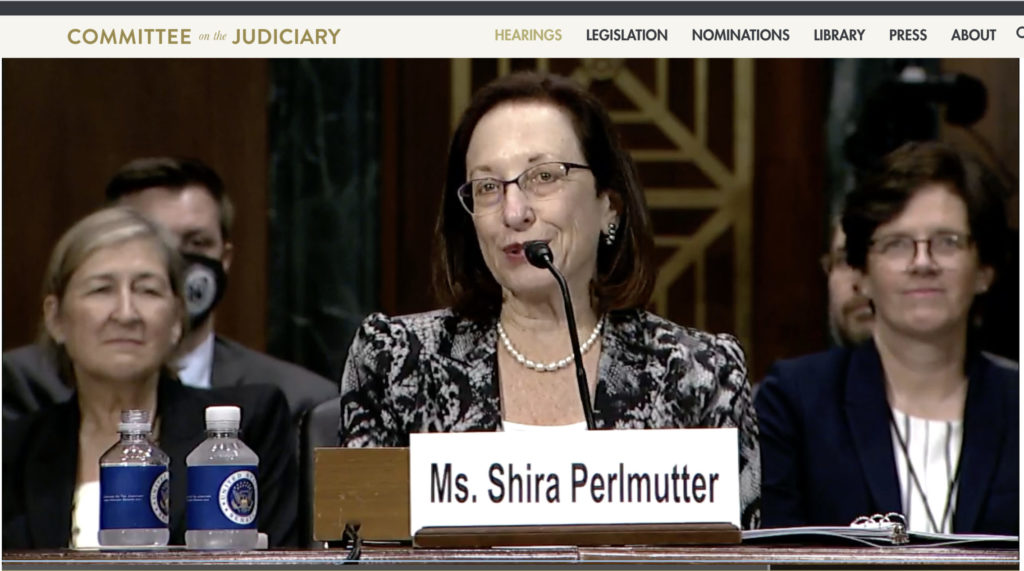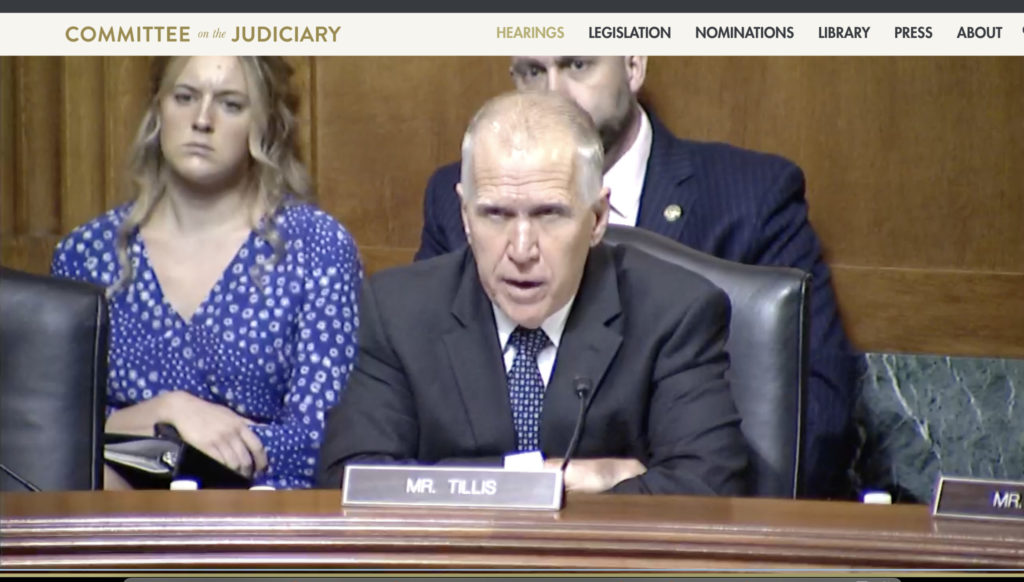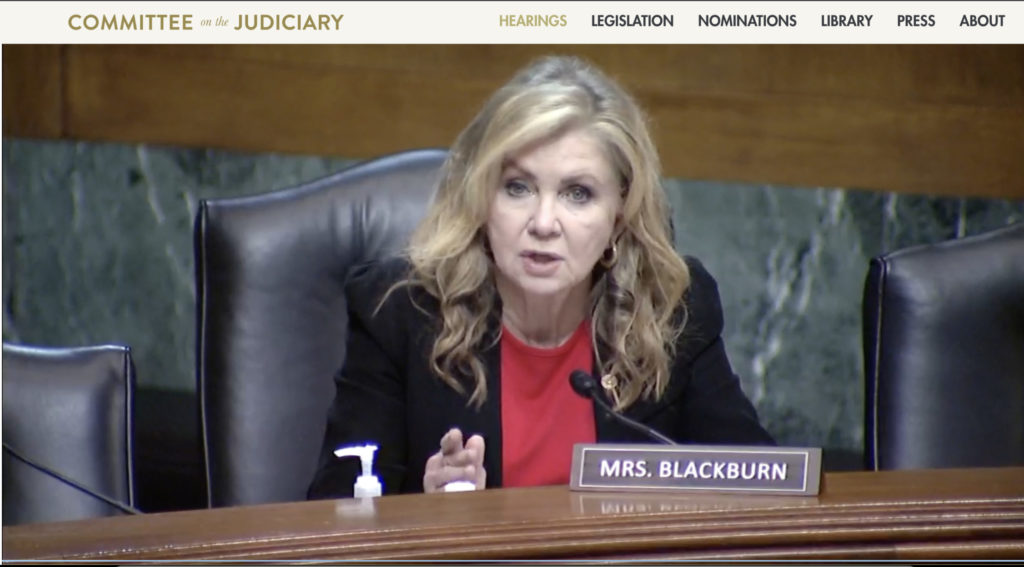“While none of the proposals being considered [on alternatives to deferred examination] would require statutory changes, they may require technology updates, Perlmutter said.”
 The Senate Judiciary Committee’s Subcommittee on Intellectual Property yesterday held a hearing on “Oversight of the U.S. Copyright Office,” with Register of Copyrights and Director of the Copyright Office, Shira Perlmutter, as the sole witness. Perlmutter updated the senators on a number of projects in process, including how the Copyright Claims Board (CCB), a small copyright claims tribunal implemented as part of the Copyright Alternative in Small-Claims Enforcement (CASE) Act, is working so far.
The Senate Judiciary Committee’s Subcommittee on Intellectual Property yesterday held a hearing on “Oversight of the U.S. Copyright Office,” with Register of Copyrights and Director of the Copyright Office, Shira Perlmutter, as the sole witness. Perlmutter updated the senators on a number of projects in process, including how the Copyright Claims Board (CCB), a small copyright claims tribunal implemented as part of the Copyright Alternative in Small-Claims Enforcement (CASE) Act, is working so far.
CCB Working Well, But Too Early to Tell on Opt-Out
To date, Perlmuttter said, 150 claims have been filed with the CCB, though it’s still too early to tell how heavy the Board’s case load will ultimately be because of the opt-out provision. As part of the compromise to create the CCB, the CASE Act established that the CCB would be an entirely voluntary process for both sides of small copyright claims disputes. This drew the ire of some who felt that the opt-out provision would only make it more difficult for claimants to hold infringers accountable. Perlmutter said they should have a clearer picture as to how many are opting out within a few months.
Fair Use Steps Into the Fray
The senators also asked Perlmutter about the pending Warhol v. Goldsmith case at the Supreme Court, which was granted certiorari in March of this year. Dozens of amici have filed briefs, including the U.S. Government, which is supporting photographer Lynn Goldsmith. Perlmutter said the view of the Copyright Office and the government is that “transformative use” should not be interpreted too broadly: “If transformative use is interpreted too broadly, it could undermine the existence of the derivative work right in copyright law; if anything that changes the original is called transformative then there is no more a separate derivative work right, which is defined to mean something that changes aspects of the original work,” Perlmutter said. Additionally, the Copyright Office is hoping the Court will reinforce its previous view that all four factors must be considered in the fair use analysis and that it will emphasize that the use in this case is for the same purpose the photographer was licensing her work for, which is quite different than if the work were being used in an art exhibit or museum, for example.
Deferred Examination Alternatives
 Senator Thom Tillis (R-NC), the IP Subcommittee’s Ranking Member, asked Perlmutter for more information on her August 1 letter to him explaining that the agency’s recent study into the feasibility of a deferred registration examination (DRE) option for copyright applicants concluded that alternative approaches for addressing those issues would achieve better results than the proposed deferred examination option. The study, and Perlmutter’s subsequent letter, followed a request by Senator Tillis last May seeking studies into several issues being faced under U.S. copyright law. Along with research into digital deposits and the statutory definition of “publication,” Senator Tillis asked the agency whether it would be possible to create an option for copyright applicants that enables them to gain the benefit of an early effective date of registration while delaying substantive examination until a later date. “While the concept of a delayed examination of a registration application and its deposit materials may appear straightforward, the details of such a process are more complex,” the Copyright Office’s feasibility study found.
Senator Thom Tillis (R-NC), the IP Subcommittee’s Ranking Member, asked Perlmutter for more information on her August 1 letter to him explaining that the agency’s recent study into the feasibility of a deferred registration examination (DRE) option for copyright applicants concluded that alternative approaches for addressing those issues would achieve better results than the proposed deferred examination option. The study, and Perlmutter’s subsequent letter, followed a request by Senator Tillis last May seeking studies into several issues being faced under U.S. copyright law. Along with research into digital deposits and the statutory definition of “publication,” Senator Tillis asked the agency whether it would be possible to create an option for copyright applicants that enables them to gain the benefit of an early effective date of registration while delaying substantive examination until a later date. “While the concept of a delayed examination of a registration application and its deposit materials may appear straightforward, the details of such a process are more complex,” the Copyright Office’s feasibility study found.
Perlmutter told Tillis yesterday that the Office is looking into a number of options that respond to concerns raised in the deferred exam study, including: a dynamic fee structure, where some fees might be lower or higher; subscription pricing options; increasing the maximum limit on the number of photographs that can be submitted as one group application; what technology would be necessary for APIs to enable hardware and software of third party organizations to achieve integration with the Copyright Office’s system; and, in the coming fiscal year, the Office plans to issue a notice of proposed rulemaking on a new group registration option for two dimensional artwork. While none of the proposals being considered would require statutory changes, they may require technology updates, Perlmutter said. The Office’s new Chief Economist is looking into potential fee structure changes and Perlmutter said she expects to start the process of updating fees in calendar year 2023.
Public Performance Rights
 Senator Marsha Blackburn (R-TN) asked Perlmutter about the United States’ position as outlier with respect to paying musicians a public performance right for terrestrial broadcast recordings and suggested she’s interested in a legislative change. In the United States, broadcasters pay composers, songwriters and publishers for the use of musical works, but do not pay the performers for use of the particular recording of the musical work. Perlmutter said she would support a change, but IP Subcommittee Chair, Senator Patrick Leahy (D-VT), noted he attempted this in 2009 and learned that such a fix would have a serious impact on small town radio stations, particularly in rural areas, who claimed it could put them out of business.
Senator Marsha Blackburn (R-TN) asked Perlmutter about the United States’ position as outlier with respect to paying musicians a public performance right for terrestrial broadcast recordings and suggested she’s interested in a legislative change. In the United States, broadcasters pay composers, songwriters and publishers for the use of musical works, but do not pay the performers for use of the particular recording of the musical work. Perlmutter said she would support a change, but IP Subcommittee Chair, Senator Patrick Leahy (D-VT), noted he attempted this in 2009 and learned that such a fix would have a serious impact on small town radio stations, particularly in rural areas, who claimed it could put them out of business.
In FY 2021, over 400,000 claims to copyright were registered with the U.S. Copyright Office for millions of works, with average processing times of 3.6 months overall. For fully electronic registrations, that timing was just over one month, and as of August 2022, the Office had eliminated the backup of physical deposits caused by the COVID-19 pandemic.

![[IPWatchdog Logo]](https://ipwatchdog.com/wp-content/themes/IPWatchdog%20-%202023/assets/images/temp/logo-small@2x.png)

![[Advertisement]](https://ipwatchdog.com/wp-content/uploads/2024/04/Patent-Litigation-Masters-2024-sidebar-early-bird-ends-Apr-21-last-chance-700x500-1.jpg)

![[Advertisement]](https://ipwatchdog.com/wp-content/uploads/2021/12/WEBINAR-336-x-280-px.png)
![[Advertisement]](https://ipwatchdog.com/wp-content/uploads/2021/12/2021-Patent-Practice-on-Demand-recorded-Feb-2021-336-x-280.jpg)
![[Advertisement]](https://ipwatchdog.com/wp-content/uploads/2021/12/Ad-4-The-Invent-Patent-System™.png)






Join the Discussion
One comment so far.
Loozap
September 10, 2022 07:42 pmThat’s great